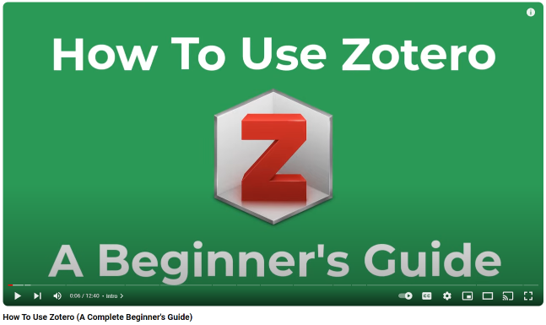10/03/24
Thanks for visiting my sociology independent study blog! This week I completed several tutorials on Zotero, Taguette and QualCoder. If you’re curious about what these are – read on.
Zotero
Zotero, and all reference managers, help to collect, organize, cite, and share research sources. These are critical tools in social research. Perhaps even moreso when working on a group project which requires increased collaboration and standardization. The research team that I’m embedded with for a portion of this independent study is using Zotero, and thus I’ll be using it as well for literature review.
I’d found my way to Zotero when I first started the sociology program at SPS. Joseph Hartnett, from the Newman Library, was hosting a Zotero workshop on Zoom and I signed up for it at the prompting of a professor. Unfortunately, I was unable to attend, so I followed up by watching Steven Bradburn’s fast introduction to Zotero on YouTube instead.

(12:40)
However, the small number of references used on my discussion board posts and essays didn’t require anything more than a few open browser tabs on scholar.google.com. So my Zotero skills languished.
This is how things remained until Professor Lorek, as part of my sociology independent study, invited me to her team’s Zotero account, and asked me to provide a few literature references on her research subject. I rewatched Bradburn’s video and used Professor Lorek’s project as a training task, bringing my Zotero skills up an adequate level by adding 6 documents along with PDFs, links, abstracts and notes. I used a combination of automated and manual methods to ensure I had a proper understanding of the tool.
Taquette and QualCoder
I hope that I have a chance to use a coding tool like Atlast.ti during my independent study. However, I also am determined to learn an affordable/free option that I’m likely to use on smaller or personal projects. After a small amount of research I settled on Taguette and QualCoder. Both programs can be used (purportedly) with Atlas.ti, due to their ability to export into the open REFI-QDA data standard, which enables interoperability between qualitative data analysis software programs.
Taguette is the simpler of the two. It took me only 30 minutes to run through a web tutorial and practice with the tool on a public dataset (Thomas Paine’s Common Sense). It took me about an hour to do the same with QualCoder, since it is a more fully featured tool, to be used with more complex coding tasks. This YouTube video was an excellent introduction to them both – teaching their functionality while comparing and contrasting the programs.

(50:31)
At this point I don’t think I’ll need to practice with them further until I actually have a dataset from an official focus group or interview.